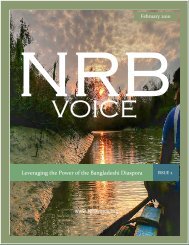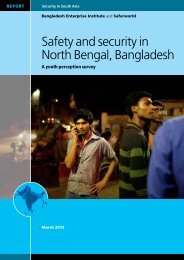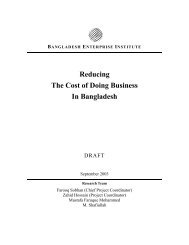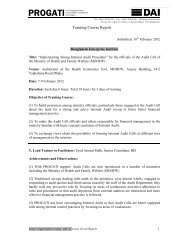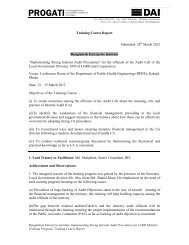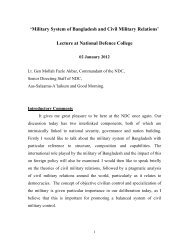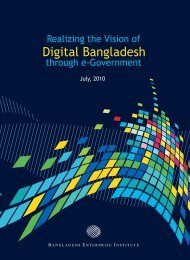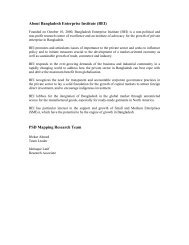Bangladesh Social Enterprise Project - Bangladesh Enterprise Institute
Bangladesh Social Enterprise Project - Bangladesh Enterprise Institute
Bangladesh Social Enterprise Project - Bangladesh Enterprise Institute
You also want an ePaper? Increase the reach of your titles
YUMPU automatically turns print PDFs into web optimized ePapers that Google loves.
capacity to pay for loans for energy consumption (such as home lighting), as well as<br />
microentrepreneurs capable of enhancing their economic prospects through the utilisation<br />
of energy loans. In convincing investors and energy companies of the value of energy<br />
partnerships with the microfinance sector, the challenge for MFIs is to demonstrate<br />
both the productive potential of energy loans and the capacity of the consumers of<br />
consumptive energy loans to repay.<br />
The increased engagement of the private sector in the microfinance industry has led to<br />
partnerships between MFIs and commercial banks, insurance companies and money<br />
transfer agencies which, in turn, has resulted in a variety of new financial products being<br />
made available for the world’s poor. These precedents were all based on challenging the<br />
perceptions and expectations of the formal partners and in this sense energy partnerships<br />
are no exception. MFIs wanting to establish energy lending portfolios must also challenge<br />
rigid attitudes towards what microfinance can achieve and be used for.<br />
Demonstrating the economic value of energy products in rural areas has to be done by<br />
overcoming some of the obstacles to expanding markets into rural areas. One of the key<br />
obstacles is that energy providers are normally urban‐based. Not being located in rural<br />
areas has implications for the installation, servicing and maintenance of energy technology;<br />
essential ingredients for the sustainability of energy lending. Due to the remoteness and<br />
dispersion of rural customers, both energy suppliers and MFIs face the prospect of high<br />
costs in accessing these, especially in relation to after‐sales service. So while agreement on<br />
warranties and service guarantees are an essential ingredient, these have the potential of<br />
adding significant costs, thus making partnership agreements unattractive or overly onerous<br />
to energy suppliers.<br />
Microfranchising – a model for increasing outreach<br />
Microfranchising holds the potential for overcoming the lack of rural penetration of energy<br />
suppliers, retailers and service agents. Microfranchising is the use of scaled‐down business<br />
ideas that are easily replicable, are directed at helping the poor, and require low start‐up



